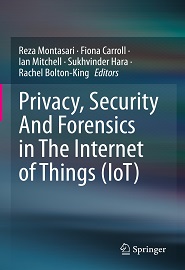
English | 2022 | ISBN: 978-3030912178 | 230 Pages | PDF, EPUB | 28 MB
This book provides the most recent security, privacy, technical and legal challenges in the IoT environments. This book offers a wide range of theoretical and technical solutions to address these challenges. Topics covered in this book include; IoT, privacy, ethics and security, the use of machine learning algorithms in classifying malicious websites, investigation of cases involving cryptocurrency, the challenges police and law enforcement face in policing cyberspace, the use of the IoT in modern terrorism and violent extremism, the challenges of the IoT in view of industrial control systems, and the impact of social media platforms on radicalisation to terrorism and violent extremism.
This book also focuses on the ethical design of the IoT and the large volumes of data being collected and processed in an attempt to understand individuals’ perceptions of data and trust. A particular emphasis is placed on data ownership and perceived rights online. It examines cyber security challenges associated with the IoT, by making use of Industrial Control Systems, using an example with practical real-time considerations. Furthermore, this book compares and analyses different machine learning techniques, i.e., Gaussian Process Classification, Decision Tree Classification, and Support Vector Classification, based on their ability to learn and detect the attributes of malicious web applications. The data is subjected to multiple steps of pre-processing including; data formatting, missing value replacement, scaling and principal component analysis. This book has a multidisciplinary approach. Researchers working within security, privacy, technical and legal challenges in the IoT environments and advanced-level students majoring in computer science will find this book useful as a reference. Professionals working within this related field will also want to purchase this book.
Resolve the captcha to access the links!